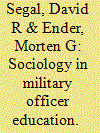| Srl | Item |
| 1 |
ID:
105841


|
|
|
| 2 |
ID:
083731


|
|
|
|
|
| Publication |
2008.
|
| Summary/Abstract |
This essay introduces a special issue of Armed Forces & Society examining sociology at military academies around the globe. Articles represent nine countries-Canada, France, Japan, the Netherlands, Russia, South Africa, Sweden, Turkey, the United States. We begin with a brief history of sociology and the military and growth of military sociology as a subfield, followed by the development of military academies in general and sociology at military academies more specifically. The essay concludes with six trends found across the nine nations and ten academies-the stigma of sociology; the cannibalization of sociology courses; co-optation of sociological concepts; charismatic leadership; radical social change; and revitalization.
|
|
|
|
|
|
|
|
|
|
|
|
|
|
|
|
| 3 |
ID:
109943


|
|
|
|
|
| Publication |
2012.
|
| Summary/Abstract |
The impact of military service on the status attainment of World War II veterans has been studied since the 1950s; however, the research has failed to come to any consensus with regard to their level of attainment. Analyses have focused on cross-sectional or longitudinal data without considering the effects of service over the life course. The authors argue that World War II veterans, regardless of race, have greater attainment, measured in terms of education, income, and occupational prestige, over their lifetimes than nonveterans. They use census data from the 1950 through 2000 Public Use Microdata Sample. The authors find that military service afforded white veterans significant advantages through their early and middle working years; however, their nonveteran peers eventually caught up. They also find that black veterans receive more of a social status advantage relative to black nonveterans, and military service helps to close the socioeconomic gap between blacks and whites.
|
|
|
|
|
|
|
|
|
|
|
|
|
|
|
|